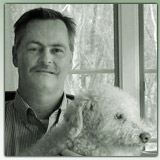Hanging Out With Nigel Slater and Damian McNicholl
 Nigel Slater (left) was feeling the effects of jet lag after his flight from London when he came down to the café at the Soho Grand Hotel, a few hours before he was scheduled to read from his memoir, Toast, but he was still up for a chat. I’d invited along Damian McNicholl (right), author of A Son Called Gabriel, because I’d imagined that putting together the two authors, who’ve written about growing up in Wolverhampton (Slater) and Northern Ireland (McNicholl) in the ’60s, might spark an interesting conversation.
Nigel Slater (left) was feeling the effects of jet lag after his flight from London when he came down to the café at the Soho Grand Hotel, a few hours before he was scheduled to read from his memoir, Toast, but he was still up for a chat. I’d invited along Damian McNicholl (right), author of A Son Called Gabriel, because I’d imagined that putting together the two authors, who’ve written about growing up in Wolverhampton (Slater) and Northern Ireland (McNicholl) in the ’60s, might spark an interesting conversation.
 After trading notes on London neighborhoods for a bit, we turned to the origins of Toast in Slater’s column for the Observer. A piece that he’d written about the memories associated with the British brand name foods he’d eaten as a child ran on a Sunday, the very next morning the phone calls from people offering book deals started coming in. Despite steady pressure from the publishers of his cookbooks over the years, Slater had “never joined the celebrity band of cookery people,” he said, carefully bracketing his personal life away from his public life. So a frank account of his childhood seemed counterintuitive at first, but he eventually became more comfortable with the idea.
After trading notes on London neighborhoods for a bit, we turned to the origins of Toast in Slater’s column for the Observer. A piece that he’d written about the memories associated with the British brand name foods he’d eaten as a child ran on a Sunday, the very next morning the phone calls from people offering book deals started coming in. Despite steady pressure from the publishers of his cookbooks over the years, Slater had “never joined the celebrity band of cookery people,” he said, carefully bracketing his personal life away from his public life. So a frank account of his childhood seemed counterintuitive at first, but he eventually became more comfortable with the idea.
Meanwhile, McNicholl had finished writing what he called a “cutting-my-teeth” novel which he almost immediately shelved, turning next to what he readily acknowledges as “a semi-autobiographical fiction—though I won’t tell anybody which parts are real.” He described much of the writing process as “expunging demons,” and said he would occasionally reread the previous day’s pages with tears in his eyes. “I’m very pleased to hear you say that,” Slater interjected; he had gone through a similar experience writing Toast. “I was writing about a lot of things I’d never really tackled before, like my mother’s death,” he explained. McNicholl believes their emotional involvement with their material works in their favor. “When people pay twenty-two, twenty-three dollars for a hardcover book,” he said, “they want to read something that’s going to move them.”
I hadn’t known about it when I started Toast, but both stories deal with their authors’ sexual confusion as young kids, dealing with the subject in a “fuzzy” (as Slater put it) way that allows, McNicholl observed, readers to “make the leap” for themselves. “It’s like the comedy programs that don’t have the laugh tracks added on,” Slater added. He noted that when the memoir first came out in England last year, people wondered aloud if it was supposed to be a coming out book. “I’m happy if they’re not sure,” he admitted. McNicholl pointed out that his novel was as much about the corrosive effect of family secrets as it was about any one character’s sexuality, which led the three of us to talk about how all families, including our own, had something kept hidden from the outside world.
Then McNicholl and I chatted with Slater about his American book tour, which was just beginning its second leg. McNicholl had written for Beatrice about touring, and Slater had been in the States a few weeks earlier to read on the West Coast, so they had some stories to tell about favorite bookstores. Slater had never read to an audience from the book when it was published in England (though he did do both the audiobook and an adaptation for the BBC), so this was all a new experience for him, but he’s finding the American audiences “delightful.” On that note, he cheerfully excused himself to take a quick nap before heading out to Borders, and I took McNicholl to a pub down the street for a quick pint before his own reading that evening at Junno’s.
22 November 2004 | interviews |

 Our Endless and Proper Work is my new book with Belt Publishing about starting (and sticking to) a productive writing practice.
Our Endless and Proper Work is my new book with Belt Publishing about starting (and sticking to) a productive writing practice. 
